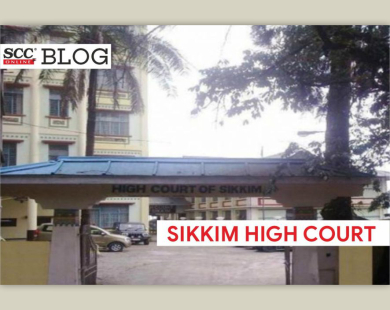Sikkim High Court – By way of writ of mandamus, the petitioners prayed for directing respondents under Article 226 of the Constitution of India, to install warning devices and appoint guard in all populated areas where the tail water of Gatti Hydro Power dam water flowed, Meenakshi Madan Rai, J., said that despite directing the State authorities to carry out bi-monthly inspections by a team of officers to ensure safety measures, as the same has not been complied with in letter and spirit. Further, awarded compensation of Rs. 35 lakhs to the petitioner.
Factual Matrix of the case
During the Nationwide lockdown on account of Covid-19, one morning three boys were crossing a river since the water level was low. However, in the midst of crossing the river, the water level suddenly swelled up and eventually was swept away due to strong current. Out of the three, only one could be rescued by the locals.
The Court in Zangpo Sherpa v. Government of Sikkim, 2016 SCC OnLine Sikk 91 had directed the State to follow the 2015 notification issued by the Home Department, Government of Sikkim, pertaining to public safety at Hydro Power Projects. In furtherance to that, the State was also directed to carry out bi-monthly inspection as well as install scientific and technical instruments necessary for ensuring the safety of the dam and the life and property of people in the area.
On complaint pertaining to the incident, a Committee was formed under Section 30 of the Disaster Management Act, 2005, whose Inquiry Report stated that Gati Infrastructure Group (‘GATI’) had complied with the directions of the 2015 notification and sirens were accordingly installed at the project site, as well as the dam site. Since the death of two persons was not due to natural calamity, GATI was absolved from paying the ex-gratia payment.
Contention of the Petitioner
GATI had completely disregarded and violated the direction of the Court in Zango Sherpa (Supra) as well as the guidelines issued by the Home Department via notification in 2015. The siren that ought to have been in place at about one kilometer each were not installed at the site of the incident.
Contention of the Respondent
Denying the allegation of the petitioner, the respondent- GATI as well as the State contended that there had been due adherence to the 2015 notification as well as the direction of the Court in Zangpo Sherpa (Supra).
It was further contended that the victims should not have been out crossing the river during the period of National Lockdown and that, had it been imperative for them to have gone out they ought to have used the foot bridge across the river and desisted from crossing the river on foot.
Court Observation, Findings and Analysis
The Court said that the respondent State duly notified the guidelines for the Hydro Power Projects; however, respondent GATI was indifferent and had a lackadaisical attitude. Even though there were sirens in places, there was no siren at the place of incident. During inspection, the state respondent failed to take into consideration that the noise that can be generated by a gushing swollen river flowing downstream, in a mountainous region, drowns out all sounds making it impossible for a person in and around the river to hear a siren six kilometers(‘kms’) away. The sirens placed at various areas were not 1-2 kms apart as per the guidelines of 2015 notification.
It was further noted that the inspecting team of the Committee did not personally visit the area concerned to check whether the sirens had been installed. The Committee was in fact trying to justify the act of GATI for not installing the sirens at the place of incident, stating that it was 4-5 kms downstream from the powerhouse.
The Court said that the Committee failed to appreciate that water once released from the Dam flows in uniformity and the rivers in Sikkim are fast flowing rivers being at the upper course.
The reason enumerated by GATI that due to lack of network the sirens could not be installed is inexcusable and incongruous. At the time of inspection, it was claimed by GATI that no caution boards were found in the vicinity, as the locals had removed them which was easily believed by the Committee withoutproof.
The Court further said that no proof of dissemination of brochures to the public or announcements on televisions, radio or newspaper articles educating the public of the specific hazards near the Hydro Power Project have been placed before this Court.
The Court condemned the authoritarian approach taken by GATI towards the people residing in and around the dam area, who took defence that the victims should not have been out and about in the area during the lock down period.
The Court held that there was a total lack of compliance of the 2015 Notification and the Court’s direction. Further, it directed the respondents to comply with the directions stated in Zangpo Sherpa (Supra) as well as the 2015 notification on all the Hydro Power Projects across the State. While referring to Nilabati Behra alias Lalita Behra v. State of Orissa, (1993) 2 SCC 746, the Court ordered GATI to pay compensation to the petitioners and the State authorities to pay costs to the Sikkim State Legal Services Authority.
[Dolma Kumari Thatal v. State of Sikkim, 2022 SCC OnLine Sikk 125, decided on 05-12-2022]
Advocates who appeared in this case :
For the Petitioners- Advocate Mon Maya Subba;
For the Respondents- Additional Advocate General Sudesh Joshi;
Assistant Government Advocate Sujan Sunwar;
Advocate Sudhir Prasad.


